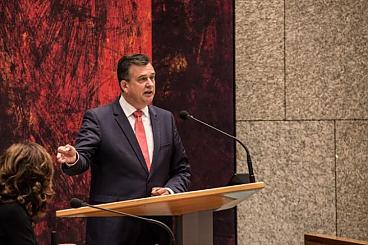Roemer: 'Government is shirking responsibility for reception of refugees’
Roemer: 'Government is shirking responsibility for reception of refugees’

In Thursday’s debate on the reception of refugees, SP leader Emile Roemer expressed strong criticism of the agreement concluded this week between the governing coalition parties. ‘It’s simple laziness to be indifferent’ he said. ‘To think that a fence around your country will keep misery outside the door. To assert that keeping the borders closed is humane. This agreement shirks responsibility for accommodating the refugees and puts it on to countries which are already doing their utmost.’
Below is the text of Emile Roemer’s speech.
There are few subjects you can think of where so many different problems and issues come together as in the discussion on refugees.
The reasons for their flight, such as war, persecution or appalling poverty; the causes of these; the involvement of the rest of the world in these causes and in the solutions to them.
When there are as many conflicts and wars as now, when more than sixty million people are put to flight, it’s bound to be that refugees will come here to seek protection, that you must then offer.
All of these pictures, these stories, that human suffering. That touches you, silences you.
There is no quick and easy solution for the huge number of refugees now coming to Europe. But we must help these people and we must help the countries in the region who are accommodating millions of refugees.
The SP has visited centres in the region but also here in the Netherlands. Do that and you can see that the Netherlands is already doing a great deal. It’s heartwarming to see how workers from the COA (The organisation responsible for the reception of asylum seekers – translator’s note) are engaged in this, but also how people around the COA reception centres are offering support and help.
When you talk with refugees you hear their appalling stories. A Syrian told how he had already waited some time in Lebanon, but that the situation was so bad there that he decided to gamble on taking the ‘death road to Europe’, as it’s known there.
That brings me to the letter from the government.
Is the Prime Minister of the opinion that Syria’s neighbouring countries are able as things stand to take in more refugees?
Is he consulting the governments in Lebanon and Turkey to ask them how they see this themselves?
Does the Prime Minister in any case consider that he is in a position to tell a country such as Lebanon, which has already taken in 1.5 million refugees – that it could take even more?
Is the Prime Minister consulting countries such as Saudi Arabia and other rich gulf states to see how they are exercising their responsibility and contributing to accommodating refugees?
We cannot solve this problem without being prepared ourselves to take our share of the bill and accommodate people here.
At the same time we must not ignore the questions that people have over what this new influx of refugees means for our country.
Are we indeed ready to house a fresh influx of refugees. Would this represent a sustainable response to war? Can we prevent and find a solution to a growth in inequality and mutual tensions in our country?
We must ask ourselves these questions, because it’s simple laziness to be indifferent. To think that a fence around your country will keep misery outside the door. To assert that keeping the borders closed is humane. But it’s also lazy to be deaf to the questions and concerns which people have.
The plan laid out by the VVD and PvdA (The governing coalition parties – translator’s note) raises expectations which cannot be realised.
It’s a plan that can’t be put into practice because it asks overburdened countries to do yet more, when they are already unable to cope.
It shirks responsibility for accommodating the refugees and puts it on to countries which are already doing their utmost.
The long-term proposal is Azmani’s plan (Malik Azmani, VVD Member of Parliament) that the VVD presented earlier in the year and of which Samsom (Diederik Samsom, leader of the PvdA group in Parliament – translator’s note) was still saying in March that it ‘is in conflict with the international solidarity and charitability for which we stand. It is moreover in conflict with many international treaties. So we’re not going to do it.’ Yet now it’s part of the decision.
But just as in the agreement to provide basic accommodation to asylum seekers the ink isn’t dry on the plan before the two coalition parties are interpreting it differently.
VVD people are demanding that discussions should focus solely on accommodation distributed throughout Europe, only if in the long term the borders are closed.
PvdA people are saying that the redistribution has now been embraced by the government and that the rest is for the ‘long term’.
Can the Prime Minister state what is now the standpoint of the government? Whether the redistribution now depends on the closure of the borders in the longer term?
